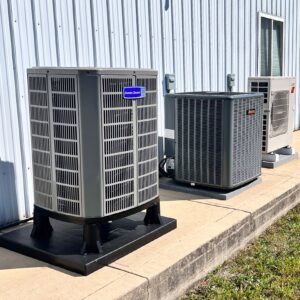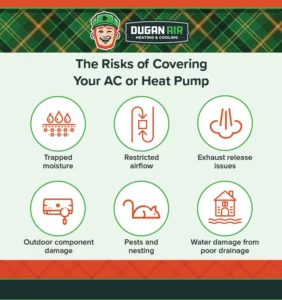Should You Cover Your Heat Pump or AC in the Winter?

As summer ends and temperatures drop, the Dugan Air Heating & Cooling technicians always receive the same question from customers: Should they prepare for fall or winter by covering their outdoor AC or heat pump system? The quick answer is no, you don’t need to cover your AC unit in winter, but there are a few exceptions.
Your outdoor units are made to endure the elements, including freezing temperatures and snow. Covering your AC unit or heat pump in the winter could risk significant damage to your home’s heating or cooling system.
Dugan Air is here to solve your HVAC problems. If you’re wondering how to prepare for the next cold snap, contact us to assess your HVAC system and help you winterize your home.
Should You Cover a Heat Pump in Winter?
In most cases, you don’t need to cover your heat pump in winter. Even though it seems vulnerable to snow, rain, and freezing temperatures, the unit is designed to be outside and will defrost itself automatically.
When Should You Cover Your AC Unit?

An air condenser unit is built to withstand cold temperatures, rain and other harsh elements from the moment it is installed on your property. Covering it is unlikely to to impact how well it runs when you turn it on again in the spring, and can cause potential issues. Covering your AC can trap any moisture already in the unit, leading to rust and corrosion of the internal coils. This is what can turn into a larger issue over time if left unchecked.
The only exception to the no-covering rule is during the fall, you may want to briefly cover your system to protect it from leaves, twigs, and other debris from entering. However, there are certain wraps that cover just the top of your AC made for this exact purpose, which is favorable over using a full cover.
Best Ways To Protect Your AC Unit From Snow and Ice
The best way to protect your AC unit from snow is to keep it clear, dust it off after a big snowfall, and shovel away drifts to prevent damage. Some people put up a snow fence or a wooden awning to protect the AC from falling snow, ice, and debris. However, a cover is not generally recommended and may even void your warranty.
The outdoor part of your air conditioner was specifically made to stay outside, even in harsh winter weather. To make sure everything is working properly, consider an annual maintenance call before you turn it back on in the spring.
How To Protect Your Heat Pump During Winter
If you’re wondering how to protect your heat pump in the winter months, the best thing you can do is keep drifting debris, leaves, or snow away from the outdoor unit to prevent blocking airflow. If you notice a large amount of ice forming on your heat pump, clear it away as soon as possible.
Stick to a regular maintenance schedule to keep your heat pump in top condition. A skilled HVAC technician from Dugan will clean and inspect the heat pump and make sure you’re ready for winter.
The Risks of Covering Your AC or Heat Pump Unit
The risks of covering your AC or heat pump include:

- Trapped moisture, leading to mold, mildew, and rust damage
- Restricted airflow making the heat pump work too hard
- Issues with exhaust release
- Damage to the outdoor components
- Creating a hospital environment for pests/nesting
- Prevent melting ice or snow from draining away from the heat pump during its defrost cycle, causing water damage
Do’s and Don’ts of Covering Outdoor AC Unit
If you decide to cover your AC unit for winter, remember the following:
- Make sure the cover you use doesn’t have entry points for rodents or small animals. They tend to be attracted to covered air condenser units because they offer shelter from the harsh Indiana winter weather conditions and they will chew on electrical wires.
- Use a breathable material to cover the air conditioner.
- Only cover the top six inches of the unit, not the entire thing.
- Check if the air conditioner manufacturer sells a weather shield that fits the condenser properly.
- Don’t leave the cover on longer than necessary.
- Don’t run the air conditioner when the condenser is covered.
When Covering an AC or Heat Pump Might Make Sense
The only exception to the no-covering rule is during the fall. You may want to briefly cover your system to stop leaves, twigs, and other debris from entering. There are certain short wraps that cover just the top of your AC that are made for this exact purpose. This is favorable over using a full cover.
The cover itself doesn’t have to be expensive to be effective. In many cases, putting a piece of cardboard over the top of the condenser is enough to protect it from snow, ice, or falling debris.
Call Dugan Air With All Your HVAC Questions
Your outdoor HVAC system should run efficiently through the winter without a cover. If your heat doesn’t kick back in after the defrost cycle finishes, or if you’re having issues heating your home, give us a call and we’ll find the cause of the issue and fix it for you fast.
Our HVAC technicians are known for delivering reliable, expert solutions throughout Franklin and nearby communities. If you join our Clover Club, you’ll receive priority service, special discounts, no overtime fees, and other benefits.
If you need help keeping your heating or cooling systems in working condition, schedule an appointment today! We’ll also install a humidifier, repair a broken air conditioner, or install or maintain your home’s thermostat.
Frequently Asked Questions
How do I protect my heat pump in cold weather?
Clear excess snow and ice from the heat pump, and if you wish, build a fence or awning nearby to keep the unit clear. As long as it’s in good working order, your heat pump will automatically defrost when necessary.
What happens if a heat pump gets covered in snow?
Snow blocking the air vents reduces the system’s efficiency. Blocked vents make the heat pump work harder to heat your home, which can damage the unit over time.
Does covering an AC unit help?
In most cases, covering an AC unit doesn’t help. Some people like to cover the top of their air conditioner during the fall to keep out leaves and debris, but this is not necessary.

HOW CAN WE HELP?
Request Service second home page


Join Our Premium Clover Club
Take Advantage of Our HVAC Maintenance Plan
Have you ever wondered if a service plan is really the pot of gold it’s rumored to be? Trust us — ours is! Signing up for a Premium Clover Club membership includes the following perks:
- Annual heating and cooling checks
- Discounts on repairs and parts
- Waived service call and overtime fees
- Priority scheduling
- Peace of mind
 Upgrade Today: $2,009 Buy-Back Credit for Your Old AC & Furnace! Financing Available!
Upgrade Today: $2,009 Buy-Back Credit for Your Old AC & Furnace! Financing Available!





